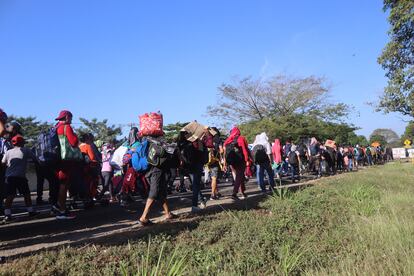New migrant caravan leaves southern Mexico on Christmas and advances towards US border
Thousands of people have begun crossing the country as a Washington delegation prepares to meet with Mexican officials to discuss the rising number of undocumented arrivals

They began their journey on Christmas Eve, while most Mexican families were preparing to gather for dinner at home. A new caravan of migrants left Tapachula, in the southern state of Chiapas, on Sunday morning and continued marching on Monday, on Christmas Day, to reach the U.S. border. According to local media and news agencies, the caravan is made up of 8,000 people, mostly from Central and South America. Some are traveling alone, while others are making the trip with their families. There are women and children, young men and teenagers. The new caravan comes after the United States announced that it would be sending a delegation to Mexico on Wednesday to discuss strategies to stem the influx of migrants. This week will be a showdown between two sides: the authorities that want to crack down on immigration, and the migrants fleeing poverty and violence in search for a better life in the United States.
The migrants are calling the caravan the “Exodus from poverty.” Far from their homes, they stopped Sunday night in a park and received food from churches and residents of Chiapas, according to Associated Press, which reported that the National Guard and local police have followed the march without intervening.
“We have walked a lot. Honestly, I don’t know how many kilometers. My daughter can’t walk anymore. I carry her in my arms because she needs to rest, she is only three years old, and she is not well, she’s sick,” a man from Honduras told Reuters. “The U.S. president should help migrants. In reality, several of us only go to the U.S. for five, six, seven years, and then we return to our countries. That’s why, we are asking Joe Biden to help us,” another Honduran man told that agency.
The rising migratory flows from Central and South America have set off alarm bells in Mexico and the United States. Between the last week of November and the first week of December, the number of migrants detained at U.S. border crossings rose by 31% — from 53,016 to 69,462 arrests — according to figures from the U.S. Customs and Border Patrol (CBP). The Mexican government of Andrés Manuel López Obrador estimates that a third of the migrants are Mexican. In response to the spike, U.S. authorities have introduced tough measures to crack down on illegal immigration, straining relations with Mexico. Washington, for example, unilaterally closed down three ports of entry into the U.S. Meanwhile, in Texas, the state passed an anti-migrant law that allows local authorities to detain and deport undocumented people to Mexico — which before now, only federal authorities were allowed to do.
The Mexican government has loudly condemned the measures and called on the U.S. to rethink its approach to the crisis. The issue has escalated and is now the top priority of the bilateral relationship. Last week, López Obrador and Biden held an official call — at the request of the U.S. president — to talk about the border crisis. In a statement, the Mexican Foreign Ministry “insisted on the need to reopen border crossings as soon as possible to guarantee dynamic trade flows and enhance the economic relationship [between the U.S. and Mexico].”
The White House, for its part, said “that additional enforcement actions are urgently needed so that key ports of entry can be reopened across our shared border.”

Biden and López Obrador announced that a U.S. delegation of top officials would visit Mexico on Wednesday and hold a meeting with President López Obrador. The delegation will be led by U.S. Secretary of State Antony Blinken, and also include Secretary of Homeland Security Alejandro Mayorkas and Homeland Security Advisor Elizabeth. It is likely that the delegation will discuss the “additional enforcement actions” that Washington wants Mexico to take in exchange for reopening ports of entry.
The López Obrador administration has consistently opposed iron-fist policies to contain migration, and demanded greater collaboration from the United States to resolve the structural causes that push people to leave their home countries and attempt the risky journey to the United States. The Mexican president has proposed directing investment to finance social and work programs in the sending countries of migrants, especially Venezuela, Honduras, Belize and Colombia. The Mexican government indicated that in Wednesday’s bilateral meeting it will insist on advancing this agenda of structural solutions.
“They don’t understand why we have to do this to get a better life,” a Honduran woman traveling in the caravan with her seven-year-old child told AP. “Why can’t they help us? We need their help.”
“This journey has been really hard for us migrants. We need the (Mexican) immigration office and the government to have some pity on us, and give us a safe conduct pass,” added a migrant from Venezuela.
The migrant caravan is hoping to continue through Mexico until it reaches the U.S. border. They will likely have traveled hundreds of miles by the time New Year arrives. But just like on Christmas, there will be no celebrations. It will pass them by like a speeding truck indifferent to those on the sidewalk.
Sign up for our weekly newsletter to get more English-language news coverage from EL PAÍS USA Edition
Tu suscripción se está usando en otro dispositivo
¿Quieres añadir otro usuario a tu suscripción?
Si continúas leyendo en este dispositivo, no se podrá leer en el otro.
FlechaTu suscripción se está usando en otro dispositivo y solo puedes acceder a EL PAÍS desde un dispositivo a la vez.
Si quieres compartir tu cuenta, cambia tu suscripción a la modalidad Premium, así podrás añadir otro usuario. Cada uno accederá con su propia cuenta de email, lo que os permitirá personalizar vuestra experiencia en EL PAÍS.
¿Tienes una suscripción de empresa? Accede aquí para contratar más cuentas.
En el caso de no saber quién está usando tu cuenta, te recomendamos cambiar tu contraseña aquí.
Si decides continuar compartiendo tu cuenta, este mensaje se mostrará en tu dispositivo y en el de la otra persona que está usando tu cuenta de forma indefinida, afectando a tu experiencia de lectura. Puedes consultar aquí los términos y condiciones de la suscripción digital.









































